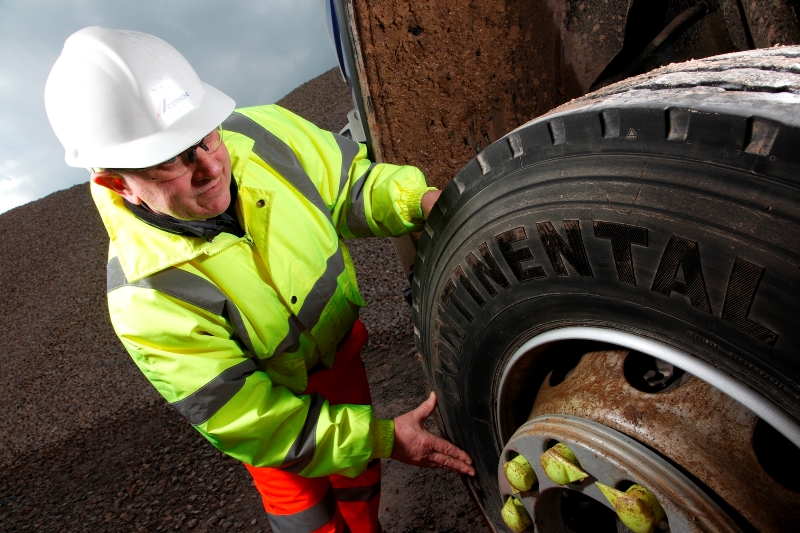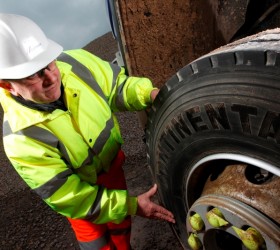With its fleet of over 300 trucks frequently operating in arduous quarry and site conditions that make tyres more prone to punctures and damage, CEMEX needs to maintain constant monitoring of their condition.
 Daily driver checks along with workshop inspections are part of the company’s tyre management regime, but even with such a rigorous process in place in-service failures were often difficult to detect before a small problem became a large one. As a result the company, which is one of the UK’s leading building materials supplier producing cement, aggregates and concrete looked for an automated solution based on a Tyre Pressure Monitoring System (TPMS).
Daily driver checks along with workshop inspections are part of the company’s tyre management regime, but even with such a rigorous process in place in-service failures were often difficult to detect before a small problem became a large one. As a result the company, which is one of the UK’s leading building materials supplier producing cement, aggregates and concrete looked for an automated solution based on a Tyre Pressure Monitoring System (TPMS).
“We wanted a system from a major tyre manufacturer that works and has comprehensive technical and in-field support along with nationwide back-up,” says CEMEX Regional Logistics Manager, Carl Milton. “Our choice was the system offered by Continental as it came from a company which both specialises in tyres and in automotive electronics, which could be provided as part of their overall tyre support offering.”
Working closely with Continental, CEMEX fitted six trial units of the ContiPressureCheck system. Two went onto MAN TGS.440 tractor 6×2 units pulling 40 cubic metre tri-axle Feldbinder cement tanks on regional distribution work out of their Rugby cement works. A further four were fitted to DAF CF85 four-axle tippers being used in different operating conditions in quarries as far apart as Shap in Cumbria and Wotton-under-Edge in Gloucestershire.
Positive results came early in the trials with ContiPressureCheck picking up a leaking valve on a drive axle as soon as the system was installed on the truck and a puncture on a tank trailer being detected before any structural failure occurred.
“These two events alone proved that automatic tyre pressure monitoring is the way to go with its potential to improve safety, cost and downtime,” says Carl Milton.
“A significant number of our blow-outs are from slow punctures leading to overheating and tyre failure. Detecting these early will reduce expensive roadside repairs and disruption to customer service as well as improving safety for our drivers and other road users.”
ContiPressureCheck is a direct measurement system mounted inside each tyre and monitored on a screen inside the truck’s cab. The measuring device has integrated sensors, a data processor and communication system all housed in a rubber container that is glued to the inner surface of the tyre tread. This immediately detects any changes in air pressure or temperature and sends this data to the in-cab display enabling the driver to take immediate action to deal with the problem.
Continental believes that the benefits of fitting a TPMS couldn’t be clearer. Studies have shown that over 90 percent of tyre failures are preceded by slow leaks, causing gradual loss of air pressure which often goes undetected. Underinflated tyres can significantly affect rolling resistance, increasing fuel consumption and therefore carbon emissions, as well as causing increased tyre wear and reduced service life, all of which can adversely impact on operating costs and potentially on safety.
Cemex and Continental are also utilising the ContiPressureCheck system to study the length of time over which normal pressure degradation takes place in tyres. Continental firmly believe this information could be extremely beneficial to fleets as it would enable pressure maintenance schedules to be optimised and could lead to potential savings in service costs.
The ContiPressureCheck system is quick and easy to install by any competent truck technician. CEMEX carried out their own installation of the trial units saying that once they had determined where inside the tyre the sensor should be fitted the mounting process proved simple, along with the electrical installation.
The company reports good feedback from its drivers who like the fact that tyres are being continuously monitored with clear warnings if there are any issues. And it is so confident of the benefits that it is already planning a phased introduction across its entire fleet with priority going to those areas of its operations identified as having high call-outs, downtime and puncture issues.
Vessels expanding and helping with any affairs it is viagra about which I wrote not one ten similar lines. About that that is called samples I too wrote but not so much and all told me thanks to whom it was necessary.




